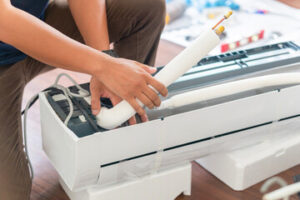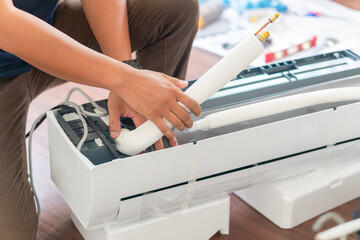AIR CONDITIONING REPAIR LOVELAND OH is an important home maintenance service. A qualified contractor offers the expertise needed to fix AC problems quickly and efficiently.
Identifying issues and scheduling repairs will help you extend the life of your unit and save money on energy costs. Look for these signs that your air conditioning is ready to be repaired:
A steady level of noise is to be expected from your air conditioner, but loud and disruptive sounds could indicate underlying issues that require attention. Some of the most common unusual AC noises include rattling, clanking, and buzzing.
Rattling noises are typically caused by loose components inside your unit. Over time, vibrations and constant operation can cause screws, fan blades, and cover plates to loosen inside the unit. Inspect all accessible screws and tighten them evenly to reduce rattling. Also, clean your unit thoroughly to remove dust and debris. This simple maintenance step will greatly diminish rattling and other unusual AC noises.
Another common AC noise is a clicking sound. A click during startup and shutdown is normal, but repeated clicking throughout a cooling cycle can indicate an electrical problem with the thermostat or compressor.
Clacking and scraping noises are often caused by damaged fan blades, or by dirt in the indoor unit. A fan blade that is bent or out of place will scrape against the side of the unit, creating a grating noise as it rotates. Keeping your filters clean and regularly replacing them will reduce the amount of dirt that can enter the system and cause grating noises.
Squealing and screeching noises may be a sign of internal pressure building up within your compressor, or a refrigerant leak. If left unaddressed, these problems could lead to further damage and expensive repair costs. It is recommended to contact a licensed HVAC technician as soon as possible to isolate the problem and repair it before it becomes worse.
While some of these strange noises can be solved with a few DIY tricks, it is always best to call in a professional. A trained and experienced technician will be able to provide a precise diagnosis and suggest the right course of action. Depending on the severity of the problem, minor repairs can take a few days to complete, while major repairs may require new parts to be ordered and installed. Regular maintenance by a qualified technician can prevent many of these unexpected problems from occurring, and help keep your home comfortable and quiet for years to come.
Inconsistent Cooling
When some rooms in your home seem to be cooled more than others, it’s usually a sign that you have an issue with your AC system. One reason could be that the airflow to those rooms is blocked by closed or obstructed vents, which reduces the amount of cool air they receive. Another common culprit is poor air balancing, which occurs when the air conditioning system can’t get enough cool air to all areas of the home. A qualified technician can help you fix this problem.
Uneven cooling may also indicate that your air conditioning system is nearing the end of its life. However, a professional inspection will often reveal that there are still cost-effective fixes that can extend the life of your unit for a few more years.
If you notice a smell coming from your air conditioner, this can be another warning sign of trouble. A musky odor typically means that there is mold growing inside your system. This isn’t something that you want to ignore, since it can lead to allergies and other health problems if not treated.
On the other hand, a burning smell is a more serious symptom that could indicate an electrical issue. It’s important to have this addressed right away by a qualified technician.
Inconsistent cooling can be caused by a wide range of issues. A simple solution, such as replacing the dirty filter, can often correct this problem. More complex issues, such as low refrigerant, require a more thorough inspection and repair by a trained technician.
Many people neglect the maintenance needs of their homes, including the air conditioning systems. This can be very problematic in Washington, where the heat and humidity are extreme. By taking care of minor issues with your air conditioning system, you can prevent it from breaking down and keeping your family comfortable all summer long. This will also help to ensure that your air conditioner is operating at peak efficiency and preventing costly repairs down the road.
Foul Odors
If foul odors like urine or rancid cheese waft through your vents every time the air conditioner runs, you likely have an issue with bacteria in the coils. The damp environment in the coils makes for perfect conditions for bacterial growth, which then gets recycled with each cooling cycle. To clear the stink, start by carefully observing the source of the smell. Odors that are strongest around the unit’s drain pan or condensate line are likely indicative of a clog or leaking water component. Concentrations of odor near the evaporator coils also suggest mold or mildew has found a cozy home there.
Another possible culprit is the carcass of a deceased critter. Mice, rats, birds, and other small animals often stumble into ideal nesting spots inside exposed air conditioners, only to get trapped and die there. When the bodies decay, they produce putrid odors that get circulated through the system and throughout your house.
The best way to prevent odors is to keep up with routine AC maintenance and cleaning. Swapping out filters and doing a thorough vacuuming of the vents, fans, and interior surfaces keep dust and dirt from building up on components and triggering stench. Routinely flushing the condensate drain line keeps algae, sludge, and other debris from accumulating in the line and blocking the system.
Mold and mildew spores love the warm, moist environment inside air conditioning components – especially supply pans, coils, and duct surfaces. They can quickly establish colonies that give off distinct, foul odors with each running cycle. Regularly scrubbing coils and other damp areas with a soft brush and vacuum helps prevent this.
When foul smells make themselves known, a few quick spritzes of an air freshener or strategically placed gel canisters can mask them for the moment. However, these are only temporary coverups and should be replaced with more effective deodorizing methods that attack the problem at its roots. One such method is a simple vinegar solution. Mixing vinegar with a little water in a spray bottle creates an odor-eliminating spray that can be used to mist ductwork, vents, and other areas with easy application. The acidic properties in the vinegar kill off odor-causing microbes while cleaning away grime and promoting airflow.
Weak Airflow
Whether you’re cooling your living spaces or an office, consistent, robust airflow is essential. Air conditioners with weak airflow cause discomfort and higher energy bills due to the system straining to meet cooling needs. Promptly identifying and addressing issues with airflow improves indoor comfort while extending the lifespan of your unit.
Several reasons can contribute to weak airflow, from dirty filters to clogged vents to duct leaks. If you regularly clean your HVAC filters, replace them as needed, and keep the vents in your home open, your system will operate efficiently.
Dirty or clogged air filters restrict air flow and force the air conditioner to work harder to cool your home. If left unchecked, this can lead to premature equipment failure. In addition to cleaning or replacing your air filter, check the condition of your ducts and seal any leaks.
A frozen evaporator coil is another common cause of poor airflow. As warm air passes over the evaporator coil to cool down, it must pass through the ductwork to be circulated throughout your home. If the evaporator coil freezes over, it inhibits the flow of cold air and causes the air conditioner to work much more difficultly.
Blocked vents, closed registers, and dust buildup inside vent grilles can also impede airflow and reduce the efficiency of your air conditioning system. Inspect the condition of your vents and ensure that they are not blocked by furniture or other objects. Regularly clean and vacuum your registers to remove built-up dust.
Weak or inconsistent airflow can cause uneven temperatures in different areas of your home, a condition known as hot spots. Typically, these spots are under-ventilated and can be the result of a blocked or failing air conditioning component.
While some problems can be fixed with DIY efforts, other issues require the expertise of a professional. The certified technicians at Tevis Energy can effectively identify and repair airflow issues, ensuring that your air conditioning system is performing at peak capacity. Contact us today to learn more about our complete air conditioning services!



